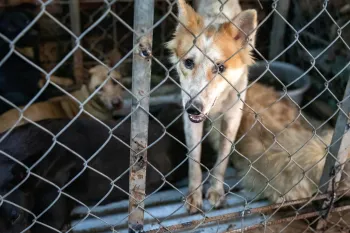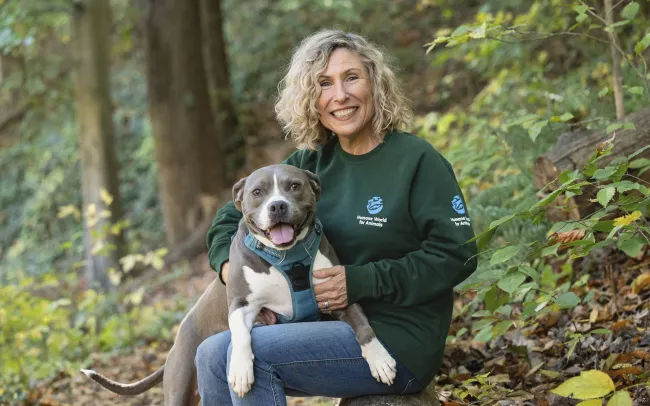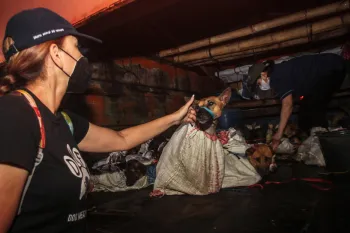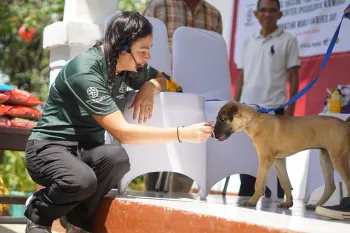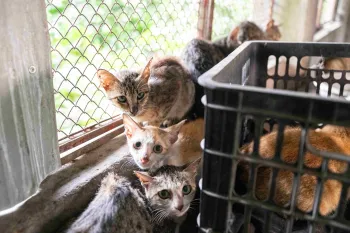The dog and cat meat trade worldwide continues to be one of the most pressing companion animal issues of our time. An estimated 30 million dogs and millions of cats—including stolen pets, dogs and cats taken from the streets or farmed—are trafficked and slaughtered every year. These animals suffer immensely at every stage of the trade. And the trade does not just impact animals; it also has a negative impact on people and communities due to the illegal nature of the trade and the role it plays in spreading rabies, a fatal disease.
However, there is significant growing local opposition to the trade, as we have witnessed in South Korea. Such public outcry, paired with our campaign leadership, led to a landmark ban that passed this year and will come into force in 2027. We are also seeing this growth in opposition in Indonesia, China, India and Viet Nam as the younger generation is becoming increasingly concerned about animal welfare and is standing up against the trade.
Our teams are working throughout Asia to end the dog and cat meat trade. These teams lead public awareness campaigns; lobby for legislation to end the trade; engage with and train law enforcement agencies; and work with those within the trade to transition owners of dog and cat meat farms, restaurants and slaughterhouses to new humane and sustainable livelihoods.
Here’s a closer look at what we achieved in 2024.
Victory in South Korea
In January 2024, after almost of a decade of campaigning, South Korea’s National Assembly passed legislation to ban the dog meat industry. The breeding, slaughter and sale of dogs and dog meat for human consumption will be illegal in South Korea by 2027. The ban allows for a three-year phaseout period, which will end in February 2027, during which dog farmers can apply for government financial support and assistance to transition to different livelihoods.
The ban was a historic moment and a monumental achievement ending the cycle of suffering of millions of dogs who would have been bred and raised on farms for slaughter in the future. Humane Society International/Korea with other local groups worked tirelessly to bring this cruel industry to an end.
This victory was made possible by the significant local opposition to the dog meat industry, with the majority of people in South Korea calling for its end. Our opinion polls show nearly 60% of the population in South Korea supports a ban on the dog meat industry, and nearly 88% said they are not willing to consume dog meat in the future.
HSI/Korea built widespread public awareness in South Korea of the immense cruelty involved in the industry. Through our Models for Change program, we have also shown that it is feasible to close the industry and transition dog farmers to alternative livelihoods. Over the years, we rescued more than 2,700 dogs who have come into our care and found loving homes in the United States, Canada, United Kingdom, Netherlands and South Korea.
We will continue to support the government throughout the transition period by building further public support for the ban and conducting rescues to highlight the plight of the dogs still in the industry until the ban comes into full effect.
The victory against the dog meat industry in South Korea provides a model for other countries to follow where the dog and cat meat trade exist.
Progress in Viet Nam
HSI in Viet Nam is working with the provincial governments in Thai Nguyen in the North and Dong Nai in the South to tackle the dog and cat meat trade, increase awareness of companion animal welfare and eliminate rabies.
In 2024, our Models for Change program in Viet Nam conducted two dog meat farm closures and a cat meat farm closure in Thai Nguyen. We also closed a dog meat restaurant and slaughterhouse in Dong Nai province that was responsible for killing thousands of animals during its 20 years of operation.
Seventy-four dogs and 20 cats were saved from slaughter because of these closures. Many have already been adopted locally, and others are recovering and will soon begin their journey to finding their new homes.
That these animals are alive is a testament to the transformational impact of our Models for Change program, which saves animal lives and betters human lives, as it helps those entrenched in this cruel business move on to kinder ways of making a living. The program also creates a blueprint that can be replicated elsewhere.
In 2024, the HSI in Viet Nam team provided several hands-on training workshops for local government representatives on spay/neuter, shelter medicine, adoption processes and rabies control. The team also collaborated with the Department of Health and Education in Dong Nai province to teach schoolchildren about rabies, an event which took place on World Rabies Day in September. More than 103,000 children learned about dog and cat health and welfare and how to prevent rabies.
Moving toward a ban in Indonesia
There is immense momentum to end the dog and cat meat trade in Indonesia: Eighty-three jurisdictions have already issued regulations restricting the business. These directives are critical steps to eliminating the dog and cat meat trade across the country.
Riding this success, the Dog Meat Free Indonesia coalition, of which HSI is a founding member, submitted three legislative proposals to the House of Representatives in Indonesia that, if passed, would transform companion animal protection in the country, including introducing a ban on the dog and cat meat trade. These would be Indonesia’s first-ever laws dedicated to the protection of companion animals and would make Indonesia the sixth nation in Asia to explicitly ban the dog and cat meat trade.
In East Nusa Tenggara, where rabies is rampant, our team also collaborated with Jakarta Animal Aid Network to raise public awareness about the link between rabies and the dog meat trade and educate communities on rabies prevention.
Restricting dog meat operations in China
In 2024, Vshine, our partner group in China, continued its collaborative work with law enforcement agencies to crack down on the country’s illegal dog and cat meat trade. This included shutting down a dog meat restaurant in July, a significant joint law enforcement action in a suburb of Beijing.
Vshine also assisted in a successful confiscation of a truck transporting 160 dogs for slaughter following a joint law enforcement action in August in Panjin, a city in the Liaoning province. This action sent a signal to the traders that whoever tries to open a dog meat restaurant faces the risk of business loss and government crackdown.
In November, Vshine helped local authorities confiscate an illegal dog truck, resulting in the rescue of 400 dogs in Central Henan's Puyang. The highway interception attracted national attention and exposed the severe cruelty of the trade.
Fighting the dog meat trade in Northeast India
While the sale and consumption of dog meat is illegal in India and not widespread, it is however common in some of the country’s Northeastern states. Stray, community and pet dogs are often snatched from the streets in neighboring Assam and illegally transported across state borders for the dog meat trade. Many of them are kept alive for days, tied in sacks with their mouths bound, until they are sold to be slaughtered.
This year, we have been ramping up HSI/India’s campaign efforts to end dog meat, with some exciting initiatives planned for 2025. We will focus on ending the slaughter of dogs and sale of dog meat in markets in Nagaland and stopping the cross-border transportation of dogs from Assam to Nagaland. We will also work to reinstate an overturned ban on the dog meat trade in Nagaland.
Looking ahead
In 2025, we will continue to raise public awareness and build opposition to the dog and cat meat trade across Asia, expand our Models for Change program, build the capacity of our local partner groups, work with enforcement agencies to enforce existing laws to restrict the trade and lobby for legislative reform to ban it. We will not stop fighting until dogs and cats are no longer stolen, transported and slaughtered for food and the dog and cat meat trade are consigned to history.
You can help bring an end to the dog and cat meat trade by making a donation to our work.
Follow Kitty Block @HSUSKittyBlock.
